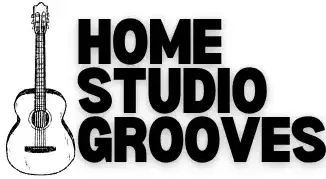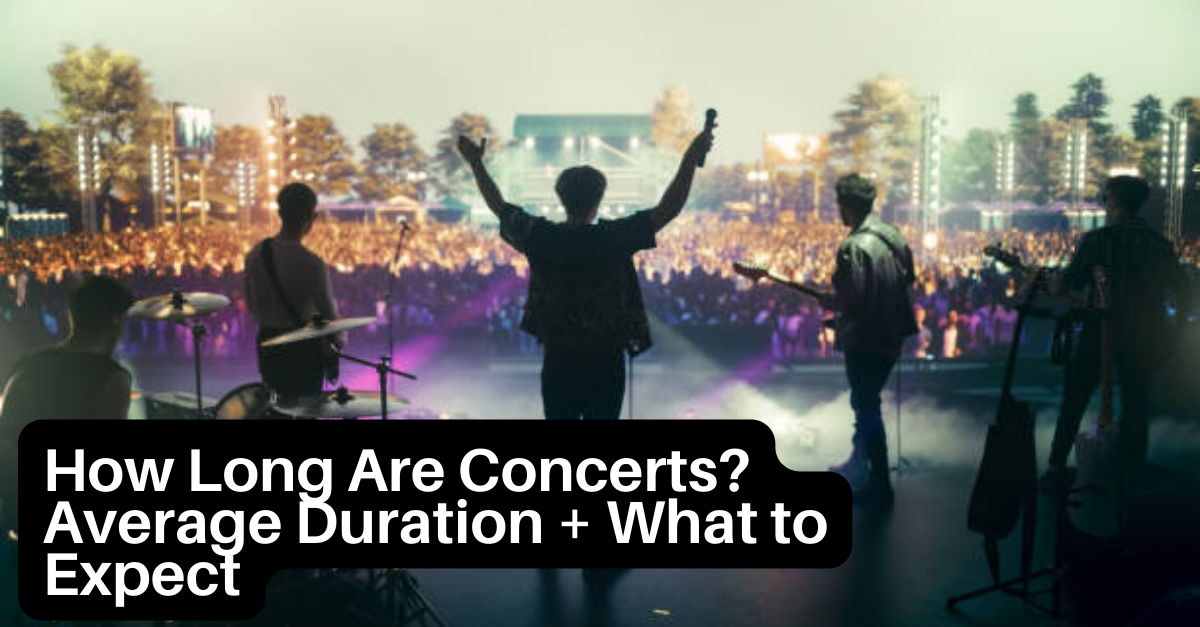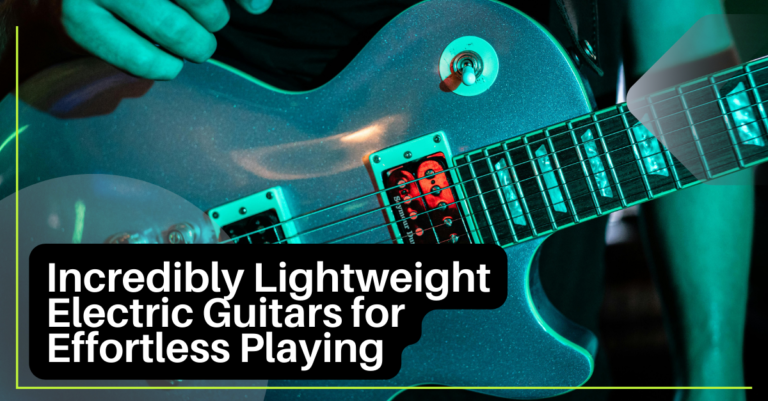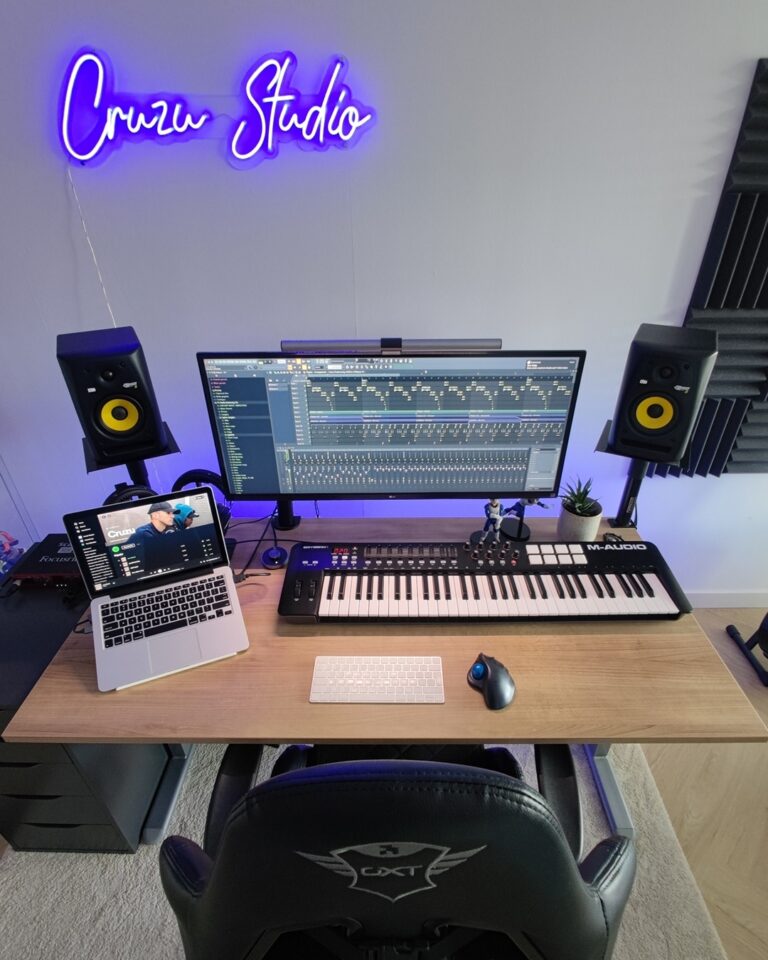If you’re wondering how long concerts are, you are definitely not alone. This is one of the most common questions people ask before buying tickets or planning a night out.
I get it. You want to know when to arrive, what time you might get home, and whether you should eat beforehand or wait until after. You might also be juggling transport, babysitters, or early work the next morning.
Most concerts last between 90 minutes and three hours, but that number changes depending on the artist, the venue, opening acts, and even crowd energy.
I have been to short club gigs that wrapped up in under an hour. I’ve also stood through stadium shows that felt like full evening events. There’s no single answer that fits every situation, but there are patterns.
Let’s break it all down so you can plan properly and avoid surprises.
Key Takeaways
- Most headlining concerts last 90 minutes to 2 hours
- Opening acts add 30 to 60 minutes per opener
- Total event time is typically 2.5 to 3 hours from doors to finish
- Most concerts end between 10:30 PM and 11:30 PM on weeknights
- Genre, venue rules, and artist style all affect concert length
How Long Are Concerts on Average?
The average concert length sits between 90 minutes and 2 hours for a headlining act. This is the industry standard, whether you’re seeing a pop star, rock band, or indie artist.
Here’s a breakdown of typical concert durations:
| Concert Type | Typical Length |
|---|---|
| Small club show | 60 to 90 minutes |
| Standard headliner | 90 minutes to 2 hours |
| Major tour | 2 to 3 hours |
| Stadium shows | Up to 3+ hours |
| Festival sets | 30 to 90 minutes per artist |
I’ve been to shows that wrapped up in under an hour and others that ran close to four hours. The variation is huge, but most fall into that 90-minute to 2-hour sweet spot.
Big touring artists like Bruce Springsteen or The Rolling Stones regularly perform for close to three hours.
Meanwhile, smaller acts or newer bands might keep things tight at 60 to 75 minutes.
Planning a live set? Here are the best free VST Plugins for Beginners that make your recordings sound like the stage.
How Long Is a Concert Usually With Opening Acts?
When you factor in opening acts, concerts usually last between 2.5 and 3.5 hours total. This includes time for setup, breaks between acts, and the headliner’s full set.
Here’s how the timeline typically breaks down:
- Doors open: Listed start time
- First opener: 30-60 minutes after doors
- Setup/break: 15-20 minutes
- Second opener (if applicable): 30-45 minutes
- Setup/break: 20-30 minutes
- Headliner: 90 minutes to 2 hours
If there’s one opener, add about 45 minutes to an hour before the headliner takes the stage. Two openers? You’re looking at 90 minutes or more of warmup acts.
At festivals, it’s different. Artists stick to strict schedules. They get their 30 or 45-minute slot and then it’s onto the next act. There’s less flexibility, but you get more variety in a shorter span.
How Long Do Opening Acts Last?
Opening acts typically last between 30 and 45 minutes. The less well-known the opener, the shorter their set usually is.
Here’s what I’ve noticed:
- Unknown/local openers: 20 to 30 minutes
- Established openers: 35 to 45 minutes
- Co-headliners: 60 to 75 minutes
Sometimes the opener is a big name on their own, just supporting a bigger tour. Other times it’s a brand new artist getting exposure. Either way, they’re working with limited time.
I’ve made the mistake of showing up “just before the headliner” and missed some incredible opening sets. You never know who might blow you away, so I always recommend getting there early.
One opener I saw years ago was so good that half the crowd bought their merch before the headliner even started. That band ended up headlining their own tour two years later.
What Time Do Concerts Usually End?
Most concerts end between 10:30 PM and 11:30 PM on weekdays. Weekend shows often run later, sometimes past midnight, depending on the venue and local noise ordinances.
The end time depends heavily on:
- Venue curfews: Many cities enforce strict noise cutoff times
- Day of the week: Weeknight shows wrap earlier
- Venue type: Clubs are more flexible than arenas
- Artist reputation: Some performers are known for going long
Stadium and arena shows usually have hard stop times. I’ve seen bands literally cut their set short mid-song because they hit curfew. It’s frustrating, but venues face serious fines if they run over.
Smaller clubs might let things go later, especially on Friday or Saturday nights. But don’t count on it. Most venues stick to schedules to avoid neighbor complaints and legal issues.
If a Concert Starts at 8, When Will It End?
If a concert starts at 8 PM, it will typically end between 10:30 PM and 11:00 PM.
Here’s the realistic breakdown:
- 8:00 PM: Doors open (not when music starts)
- 8:30-9:00 PM: First opener begins
- 9:15-9:30 PM: Break/setup
- 9:30-10:00 PM: Headliner starts
- 11:00-11:15 PM: Headliner finishes (including encore)
So even though the event “starts” at 8, you’re really looking at a 3 to 3.5-hour commitment.
If there’s no opener, the headliner might start closer to 9 PM and wrap by 10:30 or 11. But that’s less common for bigger tours.
I always plan for at least three hours from the listed door time. That way, I’m not rushing to catch the last train or stressing about parking garage closures.
What Makes Concerts Longer or Shorter?
Several factors determine how long concerts last. Some are in the artist’s control, others aren’t.
Here are the main ones.
Type of Artist or Band
Different genres have different performance styles, and that affects duration.
Rock bands tend to stretch things out with guitar solos, extended jams, and crowd interaction. A single song might run 8 to 10 minutes instead of the radio edit’s 3 minutes.
Pop shows are usually more choreographed and tightly timed. There’s less improvisation, so they stick closer to planned runtimes. You’ll get costume changes, video segments, and choreography, but the clock stays predictable.
Jazz and jam bands are wildcards. They might turn one song into a 15-minute exploration. I saw a jazz trio once where a single track became a 20-minute conversation between the musicians. It wasn’t boring, it was mesmerizing.
Classical concerts follow stricter structures. You’ll often get an intermission halfway through, and shows almost always end exactly on time. There’s less room for spontaneity.
If you’d like to get started in music production, start by recording your own voice, and take it from there.
For extra long concerts, check out some awesome Pink Nail Art Ideas For Concerts.
Setlist and Song Count
How many songs an artist plays matters, but song length matters more.
A punk band might rip through 20 songs in 60 minutes. A progressive rock band might play six songs in two hours.
Here’s a general idea:
| Genre | Typical Song Count | Average Time |
|---|---|---|
| Pop | 15-20 songs | 1.5 to 2 hours |
| Rock | 12-18 songs | 2 to 3 hours |
| Hip-hop/Rap | 15-25 songs | 1.5 to 2 hours |
| Jazz | 8-12 pieces | 1 to 2 hours |
| Classical | Varies | 1.5 to 2 hours |
If an artist is promoting a new album, they’ll probably play most of it. That can mean more songs overall, or it might mean longer intros and storytelling between tracks.
I once saw a band split their set in two. First half: their new album front to back. Second half: all the old hits. Fans loved it, but the show ran well past three hours.
Venue Rules and Curfews
This part isn’t very rock and roll, but it’s reality. Many venues have strict curfews, especially in residential areas or cities with noise ordinances.
The show must end by a certain time, or the venue risks hefty fines. I’ve watched acts get rushed off stage mid-encore because they were pushing the limit.
Smaller venues might have a bit more wiggle room, but most stick to schedules. Larger arenas and stadiums are almost always strict about end times.
If a band looks like they’re rushing through songs or skipping banter, they’re probably up against the clock.
How Long Should a Concert Be? (Artist Differences)
There’s no universal answer, but fans generally expect at least 90 minutes from a headliner. Anything less feels short unless it’s a special acoustic set or intimate club show.
Some artists have reputations for marathon performances. Bruce Springsteen regularly plays 3+ hours. Dead & Company shows often hit the 2.5 to 3-hour mark. Fans expect it, and the artists deliver.
Other performers keep it tight and focused. They play 75 to 90 minutes, hit all the big songs, and call it a night. That’s not worse, it’s just a different approach.
I saw a rapper once who performed 12 songs back to back, thanked the crowd, and walked off. No encore, no fluff. The energy was intense the entire time, and honestly, it felt complete.
Then there are artists who read the room. If the crowd is electric, they’ll extend the set. If the vibe is off, they might wrap early. It’s rare, but it happens.
What About Encores?
The encore is a classic concert tradition. The band finishes their set, walks off stage, the lights dim, the crowd chants, and they come back for “one more song.”
Encores typically add 10 to 30 minutes to the show. Sometimes it’s a single song. Sometimes it’s three or four.
Most fans love encores. It feels like you earned those extra songs by cheering loud enough. But here’s the reality: most encores are planned. They’re built into the setlist from the start.
Some artists skip encores entirely. They think it’s outdated or forced. Others do multiple encores if the crowd energy is right.
I once saw a band finish their encore, then come back a second time for a surprise cover. That spontaneity is what makes live music special.
How Early Should You Arrive to a Concert?
Arrive 30 to 60 minutes before the listed door time if you want good standing spots, first access to merch, or to catch the opening acts.
Here’s my rule of thumb:
- General admission (standing): 45-60 minutes early
- Reserved seating: 20-30 minutes early
- You care about the opener: 30-45 minutes early
- You just want the headliner: Arrive 60-90 minutes after doors
If it’s a popular show or a small venue, arriving early matters more. I’ve shown up right at door time and ended up stuck in the back with a terrible view.
For festivals, timing is trickier. You might want to camp out at one stage or bounce between acts. Plan based on your must-see list.
Planning Tips for Concert Night
Here’s what I do every time I go to a show:
Plan for 3+ hours total. Even if the concert itself is 90 minutes, you’re dealing with openers, setup time, and parking or transit.
Eat before you go. Venue food is expensive and the lines are brutal. I’ve spent half a show waiting for nachos. Not worth it.
Check the venue’s bag policy. Some places are strict about bag size or don’t allow bags at all. Don’t get stuck at the door.
Dress comfortably. You’ll be standing for hours. Wear shoes that won’t destroy your feet. I learned this the hard way at a three-hour rock show in new boots.
Leave a cushion for transit. If you’re taking public transport or booking a rideshare, factor in extra time. Concerts don’t always end when you expect.
Bring earplugs. Seriously. Your ears will thank you, especially at loud rock or electronic shows.
Final Thoughts
Most concerts last between 90 minutes and 3 hours depending on the artist, openers, and venue. The average concert length for a headliner is about 90 minutes to 2 hours, but you should plan for the full evening.
What really affects how long concerts last is the artist’s style, the number of opening acts, venue curfews, and whether there are encores. I’ve been to shows that flew by and others that felt like full-day events.
The one thing they all had in common? I didn’t want them to end. If you’re excited about the artist, you won’t be checking your watch. You’ll be lost in the moment, singing along, and hoping for just one more song.
FAQ: How Long Do Concerts Last
How long are concerts usually?
Most concerts are usually 90 minutes to 2 hours for the headlining artist. When you include opening acts and breaks, the total event typically lasts 2.5 to 3 hours from start to finish.
How many hours does a concert last?
A concert lasts between 1.5 and 3 hours on average. Headliners perform for 90 minutes to 2 hours, while opening acts add another 30 to 60 minutes. Major tours and stadium shows can run up to 3.5 hours or more.
How long do opening acts last?
Opening acts last between 30 and 45 minutes. Lesser-known openers might play for only 20 to 30 minutes, while more established opening acts can perform for up to 45 minutes or longer.
What time does a concert usually end?
Concerts usually end between 10:30 PM and 11:30 PM on weeknights. Weekend shows may run later, sometimes past midnight, depending on the venue’s curfew and local noise ordinances.
If a concert starts at 8, when will it end?
If a concert starts at 8 PM (doors open), it will typically end between 10:30 PM and 11:15 PM. The headliner usually takes the stage around 9:30-10:00 PM after opening acts and performs for 90 minutes to 2 hours.
Do concerts ever start on time?
Concerts rarely start on time. The listed time is when doors open, not when music starts. Opening acts typically begin 30 to 60 minutes after doors, and headliners usually take the stage 1.5 to 2 hours after the listed start time.
How long is a typical concert?
A typical concert is 90 minutes to 2 hours for the main act, with a total event time of 2.5 to 3 hours, including opening acts. Genre, venue, and artist style all influence the final duration.
How long do encores last?
Concert encores usually last 10 to 20 minutes, often including two to three songs. For major artists, they can stretch longer, sometimes over 30 minutes. Encores serve as a high-energy finale to the main set and often feature the band’s most popular hits.










